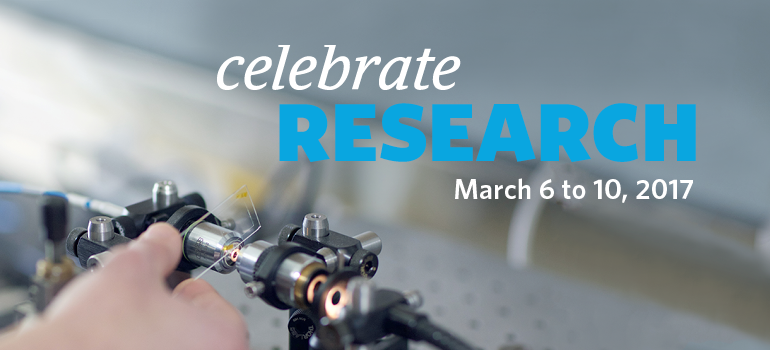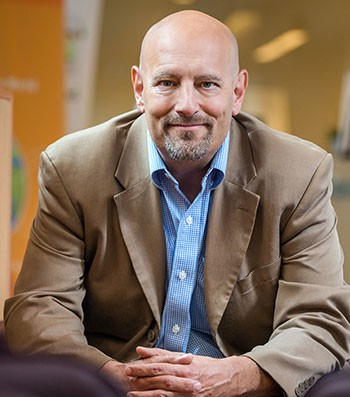
From advances in chronic disease interventions to improving wireless communications, innovative research projects at UBC Okanagan are attracting national attention.
This week, the Canada Foundation for Innovation (CFI) awarded $1 million to a diverse range of emerging initiatives across the Okanagan campus. Celebrating these and many other accomplishments, UBC Okanagan hosts its annual Celebrate Research Week March 6 to 11.

Philip Barker, UBC Okanagan Vice-Principal of Research
“I am delighted that the outstanding research taking place at UBC Okanagan is being recognized by the Canada Foundation for Innovation,” says Philip Barker, UBC Okanagan Vice-Principal of Research.“These awards reflect the hard work, commitment and vision in our research community. Our campus continues to excel and the recent funding announcement is testimony to this. I congratulate everyone involved.”
The CFI awards will support the establishment of five research facilities:
The Centre for Translational Research in Behaviour Change for People with Chronic Conditions
Led by Kathleen Martin Ginis, professor in the School of Health and Exercise Sciences, this centre will become the site for community-engaged behaviour change research to promote health and well-being for individuals with chronic disease or physical disabilities. Initiatives include improving behavior-change interventions, developing, testing and evaluating the impact of interventions, and developing products and services for people with chronic conditions.
The Statistical Machine Learning Laboratory
Led by Jeffrey Andrews, assistant professor of statistics, this lab will develop new computational methods and software for discovering hidden information in large data sets. The lab will train students in cutting-edge statistical pattern recognition techniques that can be applied to data from numerous fields, including medicine, marketing, sociology, and biology. Collaborations with local industry and government agencies will provide additional benefits to the Okanagan region.
The Molecular and Materials Simulation Facility
Led by Gino DiLabio, associate professor and head of chemistry, this lab will be a high-performance computing laboratory which will simulate chemical reactions that can lead to, and protect against, human diseases. These findings will have implications for debilitating diseases such as Alzheimer’s. The center will promote collaboration with academic and industrial partners, and will train the next generation of simulation scientists.
The Laboratory for Single Molecule Mechanobiology
Led by Isaac Li, assistant professor of chemistry, this lab will determine how the mechanical forces from individual molecules regulate cell movement and chemical signalling, specifically in cancer and immune cells. The findings will lead to the development of new screening methods that will detect rare cancer cells from blood tests.
The Electromagnetics Testing and Characterization Laboratory
Led by Loïc Markley, assistant professor of electrical engineering, this lab will evaluate and develop new metamaterials, microwave circuits, and antennas for advanced wireless technologies. The facility will provide UBC Okanagan with the infrastructure necessary for state-of-the-art experimental research at microwave and mm-wave frequencies. This will lead to developments in telecommunications, wireless power, and imaging.
Celebrate Research 2017 public events
Three Minute Thesis (3MT) Final
The Three Minute Thesis is a competition where current graduate students have three minutes to explain the depth, significance and wider impact of their research to the judges and audience for a chance to win top honours and prize money.
Date: Wednesday, March 8
Time: 4 to 5:30 p.m.
Location: University Centre Ballroom, room UNC 200
For more information: 3mt.ok.ubc.ca
Café Scientifique: Breaking the Cycle of Chronic Pain
Side stepping the effects of stroke
Someone in Canada has a stroke about every nine minutes. Are there new approaches to reduce the disability associated with stroke? Can healthy lifestyles help people reduce their risk of stroke and enhance recovery?
Join experts from UBC’s Institute for Healthy Living and Chronic Disease Prevention and Interior Health for refreshments and a discussion about the latest approaches to reduce the effects of stroke.
Date: Thursday, March 9
Time: 5 to 7 p.m.
Location: Okanagan Regional Library, 1380 Ellis St., Kelowna
Free registration: sidestepstroke.eventbrite.ca
School District 23 Science Fair
Young scientists will be at UBC Okanagan for School District 23’s two-day Science Fair. Participating individually and in pairs, students will interpret their science projects for judges and public viewers. On Saturday, students and the public can also explore educational opportunities in UBC Okanagan’s Engineering, Chemistry and Education programs.
Date: Friday and Saturday, March 10 and 11
Times: Friday, 4 to 7:30 p.m.; Saturday, 9 a.m. to 1:10 p.m.
Location: UBC Okanagan, Engineering, Management & Education (EME) and Fipke Centre (FIP).
Presentations will be held in UBC Okanagan lecture theatres on March 11
- 3-D Printing: 11:45 a.m. to 12:25 p.m. l FIPKE 204
- Engineering with Light: 11:45 a.m. to 12:20 p.m. l EME 0050
- What is Chemistry (and Why should we Care)? 12:30 to 1:10 p.m. l EME 0050
For more information visit: sd23sciencefair.com
—30—